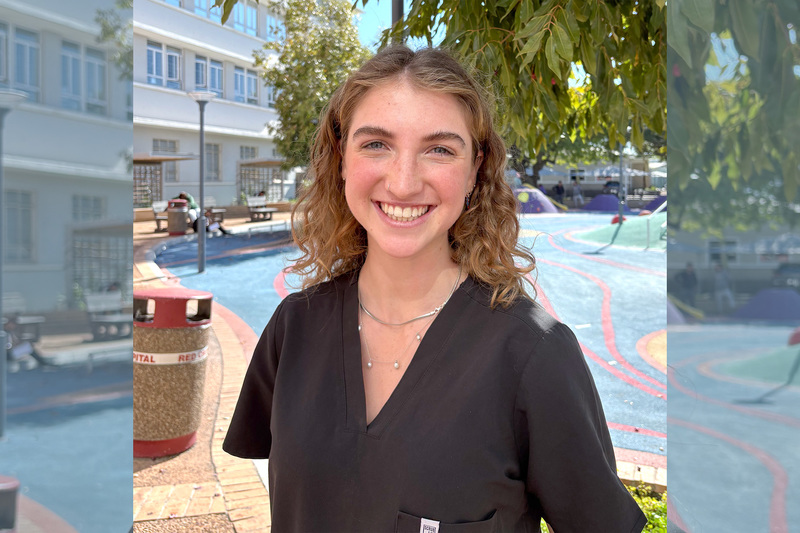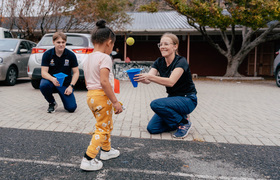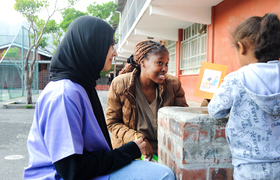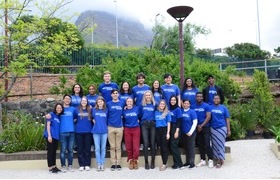From our hospital’s wards to the Budget Speech
12 June 2025 | Story Nicole Forrest. Photo Supplied. Read time 6 min.
On 21 May, Minister Enoch Godongwana presented the revised 2025 budget to South Africans, after more than three months of deferments and delays due to disagreements within the Government of National Unity (GNU). One surprise mention in his delivery was about a young student doctor’s open letter highlighting the plight of healthcare workers in South Africa.
Sarah Stein is currently in the middle of the fifth year of her Bachelor of Medicine and Bachelor of Surgery (MBChB) at the University of Cape Town (UCT). When she was choosing what to study, she said, medicine seemed like a logical choice, given her marks and areas of interest.
“I chose to study medicine for logistical reasons, really. I had good marks, I enjoyed biology, and it was a very familiar space for me. I thought that it would just make sense to start medicine – seeing as I had the opportunity – and then I could change courses later on if I didn’t like it,” she explained.
Despite toying with the idea of switching fields over weeks, months and now years, Stein has chosen to stick with her medical studies.
“Being able to work with people and feel like you’re really helping them to get better and get healthier is a privilege. To feel like you’ve made a difference in someone’s life is a very unique thing to be able to do, and I value that,” she said.
A crisis of purpose becomes a call to speak out
As virtuous as practising medicine might be, though, it’s not without its challenges. Challenges that start long before students even reach the clinical years of their studies, Stein noted.
“When I was seriously considering changing degrees in third year, I had a conversation with my sister, and she asked me what I would realistically swap to if I had to. And I had no idea. I felt like medicine had stripped me of all of my interests and my hobbies. It was very upsetting; because even though I wanted to leave, I felt that there was nowhere else to go,” she said.
At the same time, after completing a research project under Dr Heidi Mattison from the UCT Ethics Lab, Stein was becoming intensely interested in the ethics of medicine.
When her clinical blocks began in fourth year and the reality of working in South Africa’s public healthcare system started to hit home, she began to question many of the practices prevalent in the medical field.
“In my first clinical year, it was extremely difficult to be confronted with so much trauma and emotional and physical strain. Then you have the fact that you’re thrown into the clinical environment – which is entirely its own ball game, with the hierarchies, and learning on the job in a situation where you don’t have the resources to do that job properly,” Stein explained.
This led her to think more deeply about the ‘rights’ and ‘wrongs’ of medicine. It was an enquiry that Dr Mattison encouraged strongly – and which resulted in the article that was referenced by minister Godongwana in the May Budget Speech.
“As soon as I’ve finished a block, [Dr Mattison and I] have a meeting and unpack everything that I saw during that block. With everything I’ve shared, Dr Mattison has been saying for a while that I need to write about these things,” Stein explained.
“This year, after I’d recovered from burnout and then gone into my gynaecology block to see exactly the same things happening, I decided to take Dr Mattison more seriously and write about my experiences.”
“Things haven’t changed in reality. In fact, provincial healthcare budgets were actually cut …”
Honoured to be heard; still hoping to be helped
Of course, Stein recognises the great privilege that she has in being able to study such a well-regarded degree at the top university on the African continent, along with the benefits that learning within such a challenging system can bring.
“We learn so much so quickly,” she reflected. “I think we have an enormous amount of exposure as medical students in South Africa; more than most medical students everywhere [else] in the world. So to be able to see as much as we do – as challenging as it is to operate in this health system, with all of the issues that we have – we are kind of lucky to be exposed to them,” she said.
However, the benefits of gaining such unique experience do not by any means negate the drawbacks of working in a resource-scarce, sometimes hostile environment. Hence Stein’s gratitude for having Minister Godongwana shine a light on her article.
“It’s kind of bittersweet; because on one hand, it’s awesome knowing that the finance minister and other people who are high up and have the power and ability to make change are aware of what people on the ground are feeling and seeing and thinking.
“Then, on the other hand, things haven’t changed in reality. In fact, provincial healthcare budgets were actually cut, so that’s disheartening; and also a little scary, for how things will end up looking in the future,” she said.
Read Stein’s article, “In the face of death amid a failing system – A student on what they don’t teach in medical school”, in the Daily Maverick.
 This work is licensed under a Creative Commons Attribution-NoDerivatives 4.0 International License.
This work is licensed under a Creative Commons Attribution-NoDerivatives 4.0 International License.
Please view the republishing articles page for more information.










